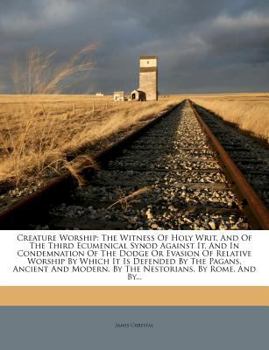Creature Worship: The Witness of Holy Writ, and of the Third Ecumenical Synod Against It, and in Condemnation of the Dodge or Evasion of
"Creature Worship" by James Chrystal explores the theological arguments against the worship of created beings. Drawing from Holy Writ and the pronouncements of the Third Ecumenical Synod, Chrystal condemns idolatry as practiced by ancient and modern pagans, Nestorians, and the Roman Church. He meticulously dissects and refutes the concept of relative worship, a defense often used to justify such practices.
This work stands as a rigorous examination of the biblical and historical basis for monotheistic worship, offering a detailed analysis of theological controversies surrounding the veneration of saints, relics, and other intermediaries. Chrystal's scholarship provides valuable insight into the historical debates and theological nuances that have shaped Christian doctrine on worship. For readers interested in historical theology and the interpretation of scripture, "Creature Worship" remains a compelling and relevant study.
This work has been selected by scholars as being culturally important, and is part of the knowledge base of civilization as we know it. This work was reproduced from the original artifact, and remains as true to the original work as possible. Therefore, you will see the original copyright references, library stamps (as most of these works have been housed in our most important libraries around the world), and other notations in the work.
This work is in the public domain in the United States of America, and possibly other nations. Within the United States, you may freely copy and distribute this work, as no entity (individual or corporate) has a copyright on the body of the work.
As a reproduction of a historical artifact, this work may contain missing or blurred pages, poor pictures, errant marks, etc. Scholars believe, and we concur, that this work is important enough to be preserved, reproduced, and made generally available to the public. We appreciate your support of the preservation process, and thank you for being an important part of keeping this knowledge alive and relevant.
Related Subjects
History




